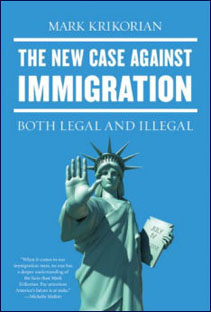 The Real Reconquista—Mass Immigration and American Sovereignty
The Real Reconquista—Mass Immigration and American Sovereignty
By Mark Krikorian
The boasts by Mexican nationalists about “reconquista” used to sound comical to most American ears, little more than banana-republic bravado. Americans who took this reconquista rhetoric seriously were breezily dismissed as cranks or alarmists, “black helicopter” people imagining world events controlled by the Trilateral Commission or, worse, by the Elders of Zion.
But as Mexican immigration—most of it illegal—has continued at levels unprecedented in history and as illegal aliens have massed in the streets issuing demands to the American people, concern over reconquista has entered the mainstream. Ron Maxwell, for instance, acclaimed film director of “Gettysburg” and “Gods and Generals,” wrote in an open letter to President Bush in the Washington Times in 2006 that “It may already be too late to avoid a future annexation of the Southwest by Mexico or the evolution of a Mexican-dominated satellite state.” Syndicated columnist Michelle Malkin wrote a piece in May 2006 entitled “Reconquista Is Real.”
This concern is justified, as this chapter will outline. But the specific outcome that these writers point to is not going to happen. There will be no secession of the Southwest from the Union. Even if federal immigration policy remains unchanged and artificially creates a Hispanic majority in the Southwest (something that the 2007 Bush-Kennedy amnesty bill would have accelerated), there are still too many non-Hispanics, and too much diversity of opinion among Hispanics themselves, for a successful irredentist movement—where an ethnic group breaks away and joins its co-ethnics in a neighboring state.
But that doesn’t mean there isn’t a problem. Mass immigration under modern conditions is bringing about a kind of reconquista—it’s just not the old-fashioned version where territory is lost, but rather a new, 21st century variety. What we are seeing, right now, is the gradual development of a new constitutional order of shared sovereignty, where the nominal borders stay the same but, through an accumulation of seemingly small American capitulations, the Mexican government gradually acquires more and more authority over the decision-making of federal, state, and local governments all over the United States—i.e., it expands its sovereignty beyond its nominal borders. Under the pretext of protecting its compatriots (a group of people which Mexico defines very broadly, as we’ll see below), Mexico City is moving toward becoming, in effect, a second federal government that American mayors and governors must answer to.
Continue at TakiMag.com



